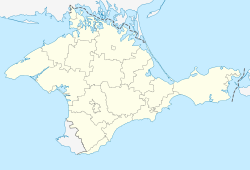Feodosia
|
Feodosia Феодосия Kefe Феодосія |
|||
|---|---|---|---|

Genoese fortress of Caffa
|
|||
|
|||
| Location of Feodosiya within Crimea | |||
| Coordinates: 45°2′56″N 35°22′45″E / 45.04889°N 35.37917°ECoordinates: 45°2′56″N 35°22′45″E / 45.04889°N 35.37917°E | |||
| Country | Russia/Ukraine | ||
| Republic |
|
||
| Municipality | Feodosiya Municipality | ||
| Elevation | 50 m (160 ft) | ||
| Population (2015) | |||
| • Total | 69,145 | ||
| Time zone | MSK (UTC+3) | ||
| Postal code | 298100–298175 | ||
| Area code(s) | +7-36562 | ||
| Former names | Kefe (until 1784), Caffa (until the 15th century) | ||
| Climate | Cfa | ||
| Website | feo |
||
Feodosia (Russian: Феодо́сия, Feodosiya; Ukrainian: Феодо́сія, Feodosiia;Crimean Tatar and Turkish: Kefe), also called Theodosia (from Greek: Θεοδοσία), is a port and resort, a town of regional significance in Crimea on the Black Sea coast. Feodosia serves as the administrative center of Feodosia Municipality, one of the regions into which Crimea is divided. During much of its history the city was known as Caffa (Ligurian: Cafà) or Kaffa . Population: 69,145 (2014 Census).
The city was founded as Theodosia (Θεοδοσία) by Greek colonists from Miletos in the 6th century BC. Noted for its rich agricultural lands, on which its trade depended, it was destroyed by the Huns in the 4th century AD.
Theodosia remained a minor village for much of the next nine hundred years. It was at times part of the sphere of influence of the Khazars (excavations have revealed Khazar artifacts dating back to the 9th century) and of the Byzantine Empire.
Like the rest of Crimea, this place (village) fell under the domination of the Kipchaks and was conquered by the Mongols in the 1230s.
...
Wikipedia



